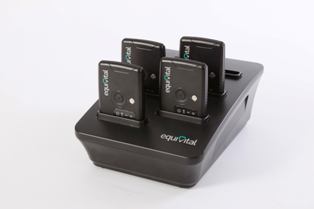Hidalgo launches new range of Equivital vital signs monitor
29 November 2011
Cambridge, UK. Wireless innovations company Hidalgo has launched its latest range of mobile vital signs monitors, the Equivital EQ02 LifeMonitor.
The technology could revolutionise the future of the healthcare and pharmaceutical industries worldwide, with customers already including NHS hospitals and international research bodies.
“The Equivital personal devices are designed to be used on a ‘wear and forget’ principle and the latest product range is being appreciated for this quality,” says Dr Ekta Sood from Hidalgo.
The new Equivital EQ02 LifeMonitor incorporates a miniaturised body-worn sensor module that senses, records, processes and transmits data from the human body.

Equivital EQ02 LifeMonitors in docking station
The data includes physiological parameters such as ECG, respiration rate and body temperature but importantly can be used to derive information — for example for biometric verification — or for creating indexes such as for stress monitoring. Using external sensors the LifeMonitor data channels can include oxygen saturation, galvanic skin response, and core body temperature.
In combination with the qView PC, mobile and web based software platform, the LifeMonitor sends information to be viewed and, where applicable, further analysed or acted upon.
“Having the ability to measure and model physiological information about the human body — in both health and disease states and on a mass scale — will lead to a better understanding of its cause and effect behaviours and catalyse an era of more proactive and personalised healthcare,” explained Dr Sood.
“Hidalgo is developing devices and software which can do this in real time so that in the future, for example, timely and appropriate action can be taken if patterns of data from the person under observation changes.
“What the Equivital brand stands for will ultimately enable an important shift in the level of control an individual can have on their own personal health and wellbeing by being better informed.”
The devices are already being put to good use in the healthcare and pharmaceutical fields. A trial funded by Oxford Biomedical Research Centre and the Wellcome Trust — and run by a team at Churchill Hospital and Oxford University — is using the Equivital LifeMonitor to continuously monitor haemodialysis patients. Such patients are at a much higher risk of sudden and potentially fatal emergencies.
Using human data taken before, during and after haemodialysis, the team is developing an index that pro-actively alerts clinicians to the likelihood of a life threatening event. This could enable timely intervention and prevent adverse situations.
Orders have already been received for the new EQ02 Equivital LifeMonitor system through distributors around the world.
Mobile human health monitoring technologies offer a significant advance in both personalising healthcare and extending care from the hospital into the community and the home. Hidalgo, which is at the cutting edge of this emerging field, believes it will see a rapid increase in the uptake and availability of such systems in the next five years.
Source: Hidalgo